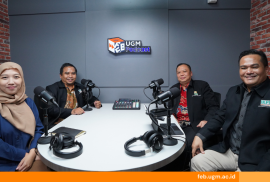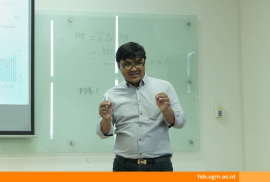In the world of economy, taxes are considered very crucial in Indonesia. This is because every year tax revenue is increasing. Not infrequently the tax revenue exceeds the target set by the state budget. Currently, tax issues are considered increasingly complex in the digital era. To discuss this topic, the Faculty of Economics and Business (FEB) UGM held a public lecture on Thursday (15/09) at the Auditorium of the FEB UGM Learning Center Building which was part of the 67th Anniversary of FEB UGM. This public lecture was given by the Tax Supervisory Commission. (Komwasjak) Ministry of Finance (Kemenkeu) with the theme “The Role of Komwasjak in the Indonesian Tax System in the Digital Era.”
The event was opened with a speech given by Prof. Dr. Didi Achjari, M.Com., Ak., CA. as the Dean of FEB UGM. Didi said that this event was a great and rare opportunity for students to ask questions directly from the experts. He also added that this public lecture could add insight and support student’s academic knowledge, especially in the digital era. Meanwhile, Prof. Mardiasmo, MBA, Ph.D. as the Chairman of Komwasjak explained that in this digital era many new things have emerged, such as e-commerce, digital tax, intangible tax, to electronic excise. He also explained the existence of Komwasjak as regulated in the KUP Law (Law on General Provisions and Tax Procedures) of 2007 which defined the various functions of Komwasjak whose task was to directly assist the Ministry of Finance and provide a second opinion directly to the Ministry of Finance, as well as partnering with the Tax Director General, Head of BKF ( Fiscal Finance Agency), Drijen Customs and Excise, and Drijen Budget.
Before starting the general lecture, Komwasjak handed over souvenirs to FEB UGM, represented by Prof. Dr. Didi Achjari, M.Com., Ak., CA. As a form of gratitude for being allowed to provide information to FEB UGM students. The general lecture was moderated by Eko Suwardi as the Dean of FEB UGM for the 2016-2021 period and Robert Pakpahan as the Deputy Chair of Komwasjak as the first speaker. In his presentation, he explained that Komwasjak was built to ensure whether the levies made by the government happened so that supervision was built. Robert explained that the tax is very complex in that there is a service business process that functions to report, and submit the report. In addition, there is also a supervisory business process that prevents people from paying taxes less or more than they should. He also said that the Tax Ombudsman was formed to ensure taxpayers pay taxes, so there are sanctions if they are late.
The second speaker, Marisi Z. Sihotang a member of Komwasjak explained customs and excise. He explained that customs as an industrial system functions to monitor the community, and the environment, facilitate trade, and also provide bonded zone facilities. Marisi added that the risk of customs and excise supervision is to guarantee whether the goods have arrived or not. In addition, Komwasjak also tackles customs issues, answering questions about how customs help in the industrial world so that the wheels of the economy run smoothly.
The last speaker in this public lecture was Anton Gunawan a member of Komwasjak. Anton explained that Komwasjak cooperates with the fiscal policy and tax incentives agency. There is a policy that makes taxes for tourism but it doesn’t work because of the pandemic that makes tourism not run. In addition, he also explained the concept of tax expenditure or tax expenditure. Tax holidays are given for corporate investments – companies are granted exemption from corporate income tax for several years depending on several regulations and it can be seen how effective it is. Anton emphasized that if the existing rules are no longer effective, it needs to be reviewed and evaluated.
The next activity is a question and answers discussion conducted by the participants. This public lecture was held to provide FEB UGM students with a deeper understanding of the role of Komwasjak and tax issues in the digital era with direct experts. In addition to increasing knowledge, it can also inspire students who are looking for thesis topics and who are doing research.
Reportage: Merisa Anggraini




